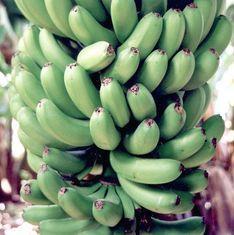
ver since the first banana shipment, 300 crates destined for New York, departed from Costa Rican shores in the early 1880s, the country’s banana export industry has grown to become a hugely important part of the economy. Today, it makes up over 20 per cent of Costa Rica’s total exports and is one of the most productive sectors in the country.
It is, however, not without its challenges. Climate change and its impact on agriculture, as well as the various crop diseases that need to be kept in check, are ongoing concerns, as are the effect of retailer price wars.
“When supermarkets like Tesco and Walmart keep lowering their prices, it’s not sustainable for the industry,” says Jorge Sauma, general manager of Corbana. “It’s a problem that needs to be addressed.”
The way to build a loyal consumer base, according to Sauma, is to focus on improving the industry’s green credentials, and two years ago the country made a pledge to become carbon neutral by 2021. “We think that our environmental efforts will be recognised by consumers, even if that hasn’t always been the case.”
Following criticism from certain NGOs about working conditions on Latin American banana plantations, the industry is attempting to improve its image. Costa Rica’s president Laura Chinchilla is keen to promote an ethical approach to banana growing. “While we are the second biggest exporter of bananas in Latin America and the industry is an important part of our economy, it is even more important from a socio-economic point of view,” she says. “Bananas from Costa Rica don’t just stand for the highest quality and environmental standards, but also employment standards.”
The minimum wage for banana plantation workers in Costa Rica is higher than in any other part of the agricultural sector and in the last few years conditions for workers and their families living on the plantations have also improved.
One example of a company that has invested heavily in its workers as well as the environment is Sura Green. The family-run business operates two farms in the Limón province, the 500 hectare Baltana and the 420 hectare Fama, which were certified under Rainforest Alliance standards in 2002 and GlobalGAP in 2003, and last year they became the first Costa Rican banana plantations to be certified as carbon neutral.
As part of a wide-ranging social responsibility scheme the company offers educational programmes and scholarships for its workers and a variety of projects focused on families and their health and welfare.
Sura Green puts impressive effort into sustainability on farms. In order to reduce water usage during packaging, re-circulating water systems are in place and filters prevent pollutants from contaminating waterways.
Reducing the use of agrochemicals is another important goal, which is achieved by planting hawkweed plants to combat erosion; the plants act as a natural erosion barrier.
The company also produces its own biofertiliser. Bananas that don’t meet the stringent quality controls are composted together with pineapple waste and the organic compost is used to fertilise the soil.
The organic fertiliser factory accelerates decomposition of leaves afflicted with disease, such as black sigatoka, breaking the disease cycle and thereby minimising fungicide use. It also contains various micro-organisms that fight nematodes in the ground, reducing the need for nematocides.
The efforts to make the banana production fully sustainable don’t end there; in order to get around one of the biggest environmental challenges for the banana industry, all plastics used on the farms are collected and taken to a recycling plant where they are transformed into angular rope which is used for shipping.
“Protecting the environment has always been a priority for us; we want to preserve the unique wildlife in our forests,” says Marcia Solano, Sura Green’s CEO. “The flora and fauna here is amazing; we have frogs, sloth bears, monkeys, crocodiles and all kinds of birds, as well as mountain tigers, just to name a few of the hundreds of species living here, some of which are in danger of extinction.”
The biggest players have also been paying close attention to their environmental obligations, with the likes of Dole and Del Monte extending global environmental policies to the country that include everything from water and pesticide use to sustainable agricultural practices.
Jorge Sandoval, director of research at Corbana, thinks current developments are headed in the right direction, but that more biotechnology could also play a part. “We will need a lot more innovation in order to become completely carbon neutral,” he says, “but there are already important developments taking place. For example, in some regions tractors are used to treat banana plantations with pesticides, generating significantly fewer carbon emissions than airplanes.”
The challenges for the future will be restricting plantations to smaller land areas as the population continues to grow, using less water, developing the practice of precision farming, and complying with stricter food safety standards. “Progress has been good but there is still a long way to go before we achieve true sustainability.” -



